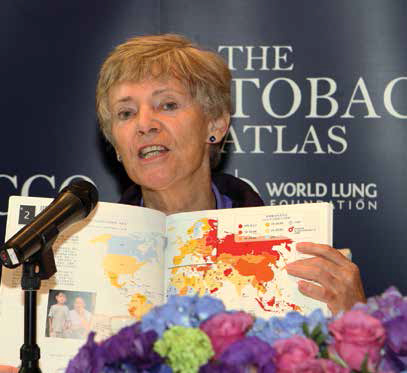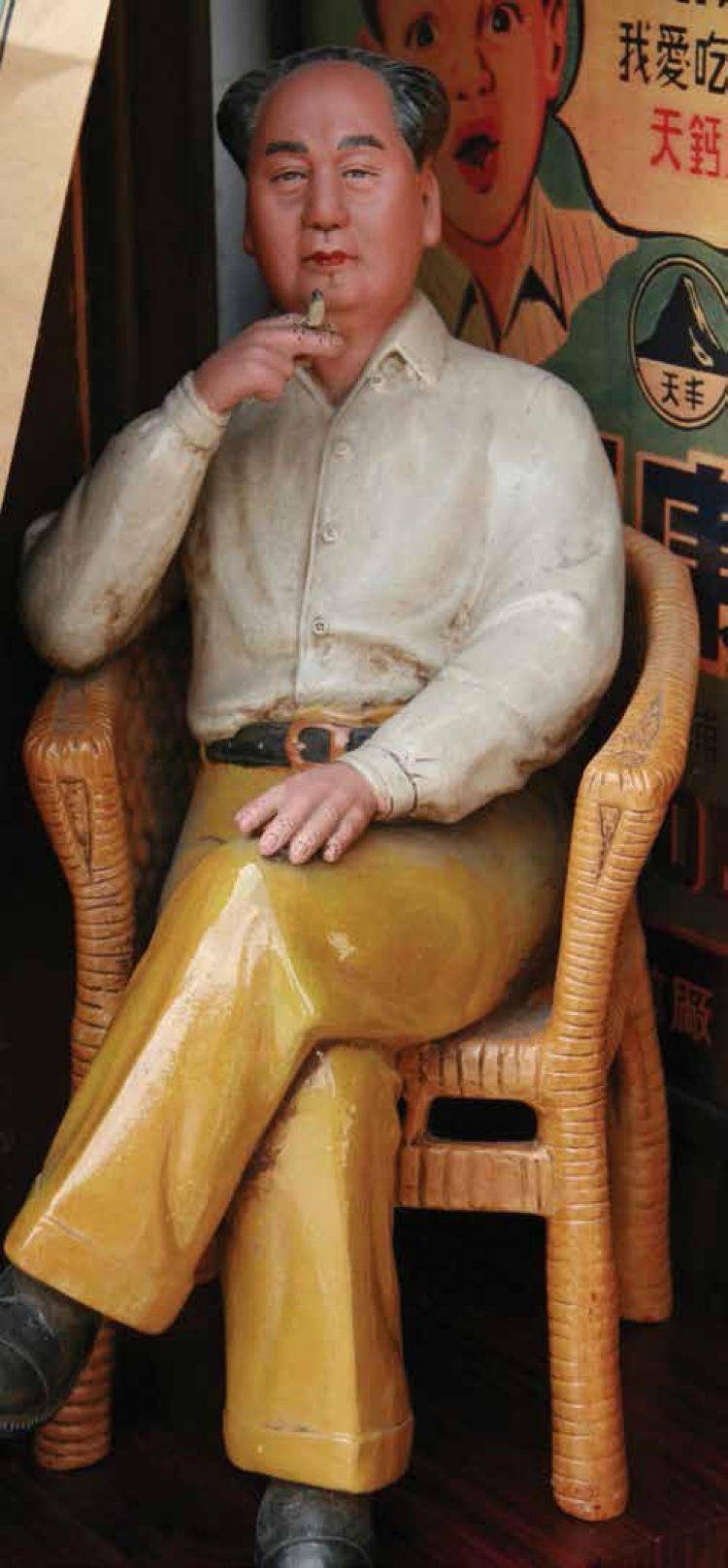Prying the cigarette out of a gambler’s hand is never easy. Perhaps it’s a little easier now than it used to be as smoking rates generally have declined worldwide, substantially so in the more developed nations, and governments have moved aggressively to restrict the habit or ban it outright as part of the global war on public tobacco consumption they began waging in earnest around 30 years ago. Restrictions on smoking in casinos are hardly new—California’s, for example, date back to 1995, New South Wales’ to 2002—but introducing them invariably is difficult and expensive, particularly in terms of the blow to the top line that accompanies them, at least initially.
In Asia, a region whose love affair with cigarettes has been long and deep, they are unheard of in the gambling space, which finds Macau as something of a pioneer in its attempt, now a year in, to strike a balance between public health and profits.
In essence this has involved carving the city’s booming gaming floors into more or less even halves, smoking and non-smoking. It’s not working, to hear it from the representatives of the croupiers and pit staff it was designed to protect. This is not surprising, since the intent hasn’t been to curtail the amount of smoke in casinos but to corral it. It hasn’t been very effective at this either, judging by air quality tests, in part because the law doesn’t require physical barriers between the halves, which often exist side by side, especially on older and smaller floors, and because management has responded, as you might expect, by moving more games, along with the dealers who man them, into the halves where everyone’s smoking.
On the plus side, at least they now provide non-smoking areas, which they hadn’t given much thought to before—and why would they, with gamblers pouring in from mainland China in increasing numbers every year, stoking a market whose revenues are the amazement of the world. The Chinese are as religious about their smoking as they are their baccarat.
China is the world’s largest consumer of tobacco. The World Health Organization estimates that one of every three cigarettes smoked on the planet is smoked there. It works out to 7,000 cigarettes per smoker per year, an increase of 40% since 1980, according to a global study conducted in 2012 by the University of Washington’s Institute for Health Metrics and Evaluation. Nationwide it averages out to 2,000 cigarettes for every adult.
WHO puts the smoking population at 300 million in its most recent Global Adult Tobacco Survey, which was published in 2010 and focuses on 16 low- and middle-income countries where more than half the world’s smokers live, eight of them Asian countries. It amounted to 28% of the adult population at that time and is supported by government statistics. The University of Washington’s study, a mammoth undertaking encompassing 187 countries, calculated China’s rate at 24%, or about 270 million adults, which is in line with their estimates for East and Southeast Asia and Oceania as a whole.
Either way it’s frighteningly high compared with a global rate estimated at 18.7%—or, by way of comparison, 16% in North Africa and the Middle East, 16% in Australia and New Zealand, 15% in North America, 13% in South Asia. China’s is not as high proportionately as Laos’ (31%) or Indonesia’s (30%) or Myanmar’s (30%). It’s much higher than Thailand’s (19%), Malaysia’s (18%) and Singapore’s (12%).
Among Chinese men it skews much higher. But this is the rule across Asia, where women generally make up less than 5% of smokers, in contrast to the West, where prevalence rates tend to run almost equal.
Something like more than half of Chinese men smoke, compared with less than 3% of women, according to WHO’s 2010 estimate. The institute puts it at 45% of men and 2% of women and finds it rising dramatically above the age of 20—the average is 56% in the prime casino demographic of men ages 35-54, which comprises more than 40% of all Chinese smokers, about 113 million people.
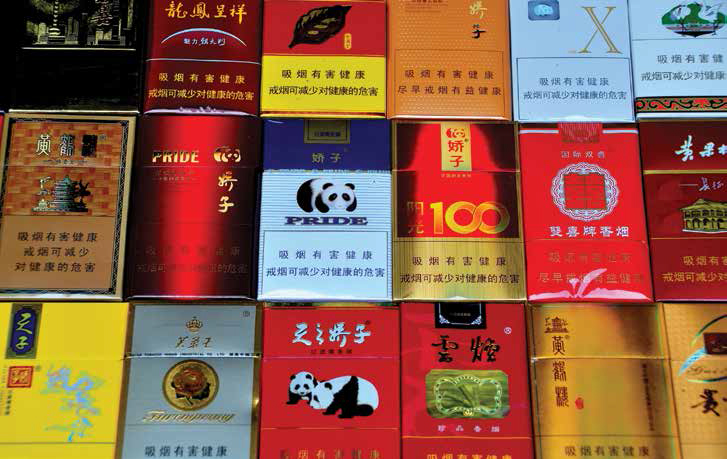
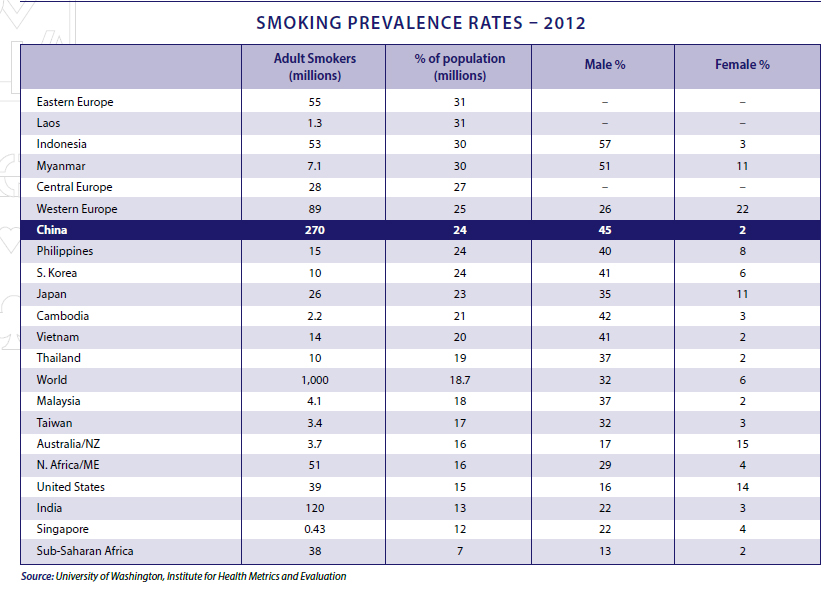
China is a signatory to WHO’s 2003 Framework Convention on Tobacco Control, which monitors public policies in areas such as prevention, treatment, awareness, marketing and advertising and taxation, but government’s efforts to curb the country’s habit have been, at best, spotty.
Some of this can be blamed on the fact that China isn’t just the world’s biggest tobacco consumer, it’s the biggest producer, home to a vast and flourishing business that’s run as the monopoly of a state-owned enterprise known as the China National Tobacco Corporation, whose operations extend across 33 provincial administrations and more than 70 state-owned sub-enterprises and another 1,000 commercial enterprises employing in all more than half a million people and specializing in everything from cultivation to sales to the machinery of manufacturing to imports and exports. In 2010, according to data compiled by the State Tobacco Monopoly Administration, it cranked out 2.78 trillion cigarettes. The taxes and profits this throws off amount to more than 7% of central government revenues. In Yunnan, the country’s main tobacco-producing province, it’s more like 92%.
“Money is at the center of the problem when it comes to resolving to ban smoking in public,” says the Chinese Association on Tobacco Control, a non-profit agency that operates under the auspices of the ministries of Health and Civil Affairs. “Governments are addicted to the economic gains generated by the tobacco industry.
” The bottom line for Macau’s casinos and their world-beating US$45 billion casino market last year may have been 3.7 million smokers, quite possibly more, and this isn’t counting Hong Kong and Taiwan and the city’s other major sources of visitation.
Design for Evasion
The Macau restrictions that took effect 1st January 2013 allow casinos to designate up to 49% of their gaming areas for smoking. All six concessionaires applied for the space in an initial range of 34% to 49% of the floors of 44 casinos.
Within days it was clear that what the government had in fact instituted was a giant loophole with some regulation around the edges.
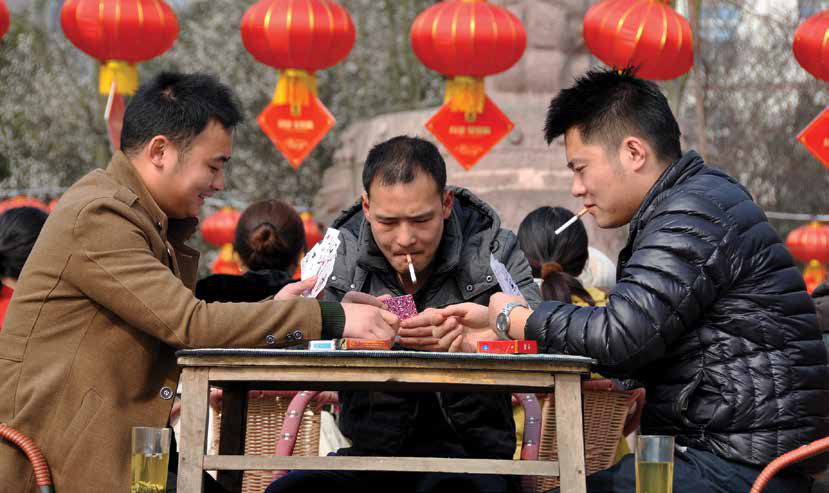
“Our front-line workers told us that casino operators are assembling the most popular games and the manually operated games together into the smoking zones and leave the automatic ones such as slot machines in the non-smoking areas,”said Choi Kam Fu, deputy director-general of the Macau Gaming Enterprises Staff Association.
“As a result,” he told the English-language Macau Daily Times, “most workers are still working in areas constantly filled with secondhand cigarette smoke. Air quality has not improved significantly, it might have deteriorated, and that’s the worst scenario, the one we were most worried about.”
The association estimated at the time that twice as many dealers were working in the new smoking areas as in non-smoking and suggested the government remedy this with some form of ratio of smoking to non-smoking tables. Nothing was done.
Around the same time, another workers’ rights group, Forefront of Macao Gaming, called for a variation of the ratio idea. They suggested eliminating slot machines and unmanned automated table games from areas counted as non-smoking. This was not taken up either.
“The government doesn’t know the difference between 50% of floor area and 50% of gaming tables, and that’s why we’re inhaling more cigarette smoke,” Forefront said. “If they don’t use the number of tables instead of floor areas for measuring nonsmoking areas, the new rule should be scrapped, otherwise we only suffer more.”
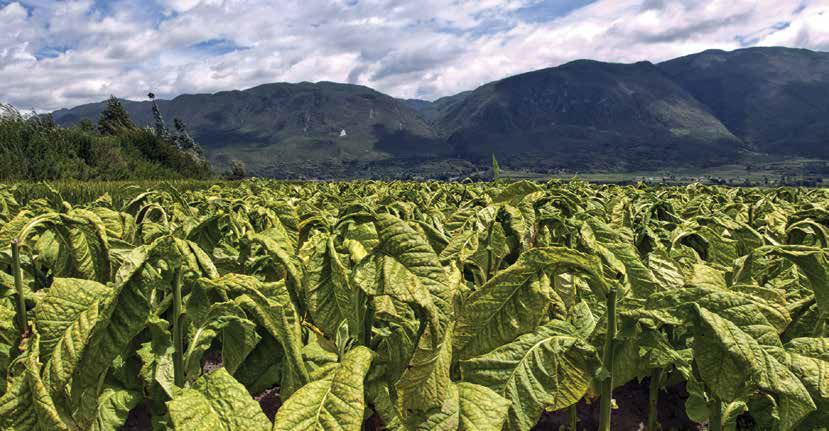
So what Forefront did was deliver a petition to the office of SJM Holdings Executive Director Angela Leong, who was running for re-election to the Legistlative Assembly. SJM’s operating entity, Sociedade de Jogos de Macau, the successor to Stanley Ho’s monopoly and the town’s largest portfolio of casinos, had applied for smoking areas at the top end of the 49% range and had secured 44% on average across 19 properties. Seventeen of these casinos are leased to third parties and operate independently of corporate management, making it difficult to crack down on things like tableshifting. Which is one reason why SJM would have a tough time complying with subsequent air quality tests. The other reason is that most of the third-party casinos are also among the oldest in town and they’re relatively small and characterized at some locations by tightly packed pits under low ceilings serviced by aging, inadequate ventilation systems.
Representatives of a labor group called the Association for the Promotion of Casino Workers’ Rights directly petitioned the Health Bureau and the Labor Affairs Bureau. That got them a meeting but little else beyond an assurance that the division by floor space, such as it is, would be strictly enforced and that the results of the air quality tests would be made public. Separately, the Health Bureau issued a directive to the industry requiring it to exempt employees suffering from heart or lung ailments and those at least three months’ pregnant from working in smoking areas.
By early February the complaints had made their way to the Legislative Assembly, where some members responded with the radical notion of a full smoking ban. This would bring the casinos into line with other public spaces in the city, most of which have been off limits to smokers since 2012. Interestingly, it was Ms Leong who spoke out the loudest for this. The government resisted, which is even more interesting. The Health Bureau’s plan is to review the law in 2015, and it appears they’re not budging from that no matter how patently flawed the rules have shown themselves to be, which proved convenient for Ms Leong, at any rate. She was re-elected handily later in the year.
Failing Grades
Last April, the Macau Health Bureau released the promised results of an initial round of air quality tests, which showed 28 of the 44 casinos failing in at least one of six criteria. Sixteen were in the SJM portfolio, Melco Crown Entertainment had eight (mostly its Mocha Clubs slot halls), Galaxy Entertainment had three (two of them managed under the company’s City Clubs franchise), and the other was Wynn Macau.
Eight failed for carbon dioxide. Six failed for a class of pollutants known as “volatile organic compounds,” which can occur naturally or can be man-made and tend to be found in all indoor environments. They’re produced by plants, animals, microbes and molds and fungi, others are the detritus of paints and coatings, cleaning solvents and gases such as methane. Benzene, a known human carcinogen, is one of them. It’s found in stored fuels, automobile exhaust and environmental tobacco smoke.
Most of the failures were for “inhalable suspended particulates”. These can be solid or liquid and work like aerosols when they mix with the atmosphere of a room. The smallest can range from “gaseous contaminants” at 0.001 micrometers and viruses at less than 0.01 micrometers to bacteria at 0.5-10.0, mold spores, which can grow as large as 100 micrometers, and heavy dust, which can be big enough to be visible.
The Health Bureau tested for 10 micrometers and 2.5 micrometers. The former (PM10, as it’s known) includes coarser stuff like dirt, dust, mold, spores and pollen. Eleven casinos failed in this category, all operated under the SJM concession. Three of them are directly operated by SJM—Casino Lisboa, the monopoly era flagship whose original structure dates back to 1970, Casino Oceanus and the adjoining Casino Jai Alai. (Jai Alai has since closed for remodeling.)
PM2.5 is of greater concern because these smaller particles are produced by toxic organic compounds and heavy metals— tobacco smoke is a leading source—and because, being smaller, they burrow deeper into the lungs. Researchers suggest that even short-term exposure at elevated concentrations can significantly contribute to heart disease. To get an idea of the risks a croupier in Macau might encounter on a given day, it’s been estimated that a bartender working around smokers passively inhales the equivalent of 10 cigarettes during an eight-hour shift. The American Medical Association associates PM2.5 with high vascular inflammation and atherosclerosis, the cause of a range of cardiovascular problems, including heart attacks. The World Health Organization blames it for about 3% of deaths from cardiopulmonary disease, about 5% of deaths from cancer of the trachea, bronchus and lungs and about 1% of deaths from acute respiratory infections in children under 5.

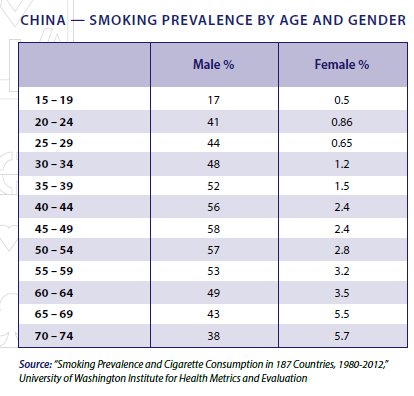
Eighteen properties failed for PM2.5. These were the Wynn/Encore Macau complex, two of Galaxy’s City Clubs casinos and 15 properties affiliated with SJM: the Lisboa and the Oceanus/Jai Alai complex, three slot venues (one of them since closed) and the rest third-party operated.
Ms Leong, who has emerged as SJM’s voice on the smoking issue, responded soon after the results were publicized, saying the company would act quickly to make improvements. Which it did. In October, the results of a second round of tests were released, showing failures reduced to 16 properties market-wide. But Secretary for Social Affairs and Culture Cheong U pronounced the results “unsatisfactory,” and the Health Bureau ordered the offenders to submit plans to reduce their approved smoking areas by 10%, as the rules prescribe. By the middle of December, all of them had: five Mocha Clubs (two of which have since closed under unrelated rules limiting gambling in residential areas), eight SJM third-party satellites and Galaxy’s StarWorld. At that point, the six concessionaires had already suggested that providing gamblers with airport-style smoking rooms might help and asked for permission to set them up. But, again, strangely, the government appeared to be in no hurry to act and instead referred the request to what Mr Cheong called a “cross-departmental government team“ for deliberation. SJM went ahead and set one up anyway at the Casino Crystal Palace, an aging two-story wing of the old Lisboa. Ms Leong said the rooms might be added at other properties.
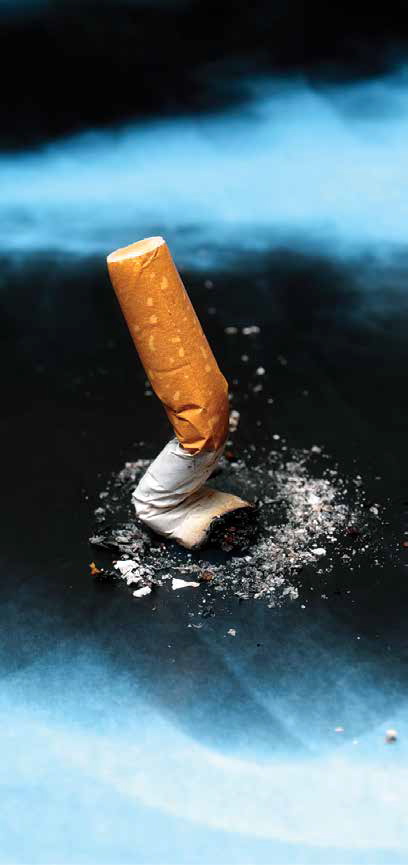
Problem China
Across the border in China, 1 million people will die this year from tobacco-related diseases. An estimated 100,000 of these deaths will come from exposure to second-hand smoke, which will afflict some 740 million non-smokers on a daily basis. The World Health Organization expects the country’s tobacco-related deaths to increase to 3 million over the next generation.
The central government has set itself the lofty goal of banning indoor smoking in public areas by the end of this year, and to set an example government officials have been told not to puff in public places such as hospitals, public transport or schools while on duty. Critics have their doubts. The Ministry of Health issued guidelines three years ago prohibiting smoking in places like hotels and restaurants only to have them routinely flouted because they aren’t “strictly enforced,” according to Xinhua.
The Chinese Association on Tobacco Control notes that about half the country’s 300 or so cities have ordinances restricting smoking. Guangzhou, the capital of Macau’s neighboring province of Guangdong—the casinos’ second-largest single feeder market after Hong Kong—has one of the strictest. The deputy director of the Standing Committee of the Guangzhou Municipal People’s Congress saw the effects for himself when he showed up at the city’s main bus terminal on an inspection tour last October to find people smoking everywhere. With a flock of bureaucrats and journalists at his heels he confronted one of the offenders, an elderly man, who promptly offered him a cigarette.
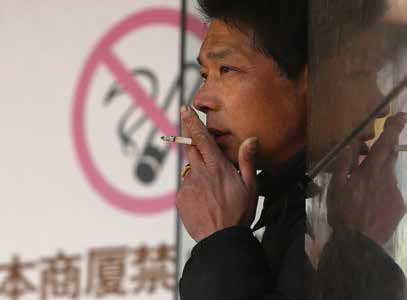
Fifteen government departments are responsible for enforcing Guangzhou’s restrictions. The staff involved totals more than 2,700. Since the curbs were introduced 13 months ago, more than 120,000 checks have been conducted and more than 4,000 “rectification notices” issued. As of January, in a city where it’s estimated that more than one in five adults smoke, only one person and five companies have been fined. To date these have totaled 26,550 yuan, or a little over US$4,000.
In 2008, with an eye on its Summer Olympics image, Beijing enacted a law requiring restaurants and bars to provide non-smoking sections and set a goal to ban smoking in all indoor spaces by 2010. Last year, with the games well back in the rearview mirror, the ban was postponed to 2015. CATC says that in five years the law has not resulted in a single fine.
Xinhua reports that the National Health and Family Commission is now working on a law for all of China that spells out clear punishments. But anti-smoking advocates contend that until government breaks its dependence on the revenue from its own tobacco conglomerate, enforcement will continue to be lax.
“China stands on its own in the magnitude of the problem,” said Dr Judith Mackay, the senior advisor to the World Lung Foundation. “Unless there is change in China, we won’t proceed further in reducing the tobacco epidemic in the world.
” The consequences are far-reaching, as she points out. “It’s a huge economic problem. There’s all these things ranging from medical and health care costs, the costs to the families, and there’s the cost of second-hand smoke.
” All of which Macau and its people and those whose job it is to promote their welfare have only begun to tally.
